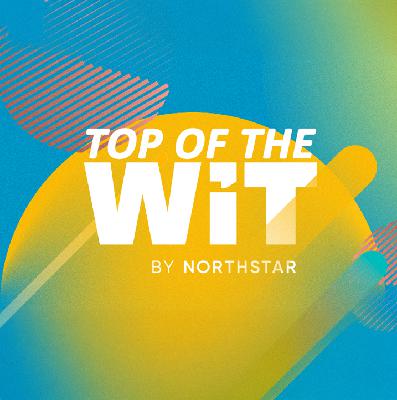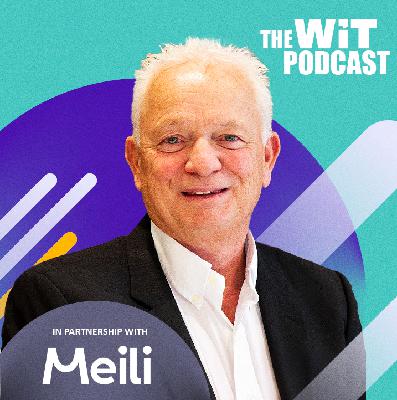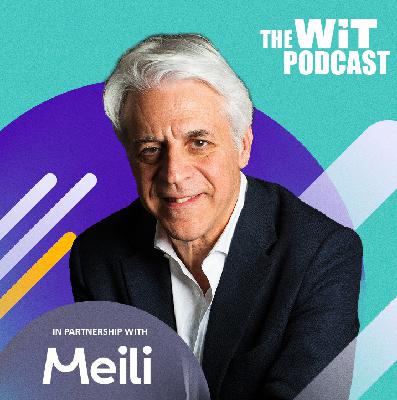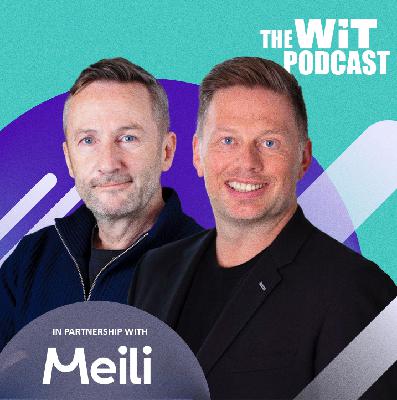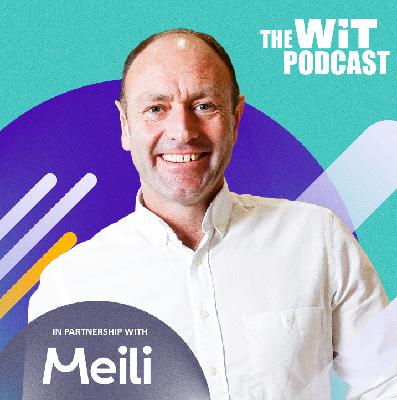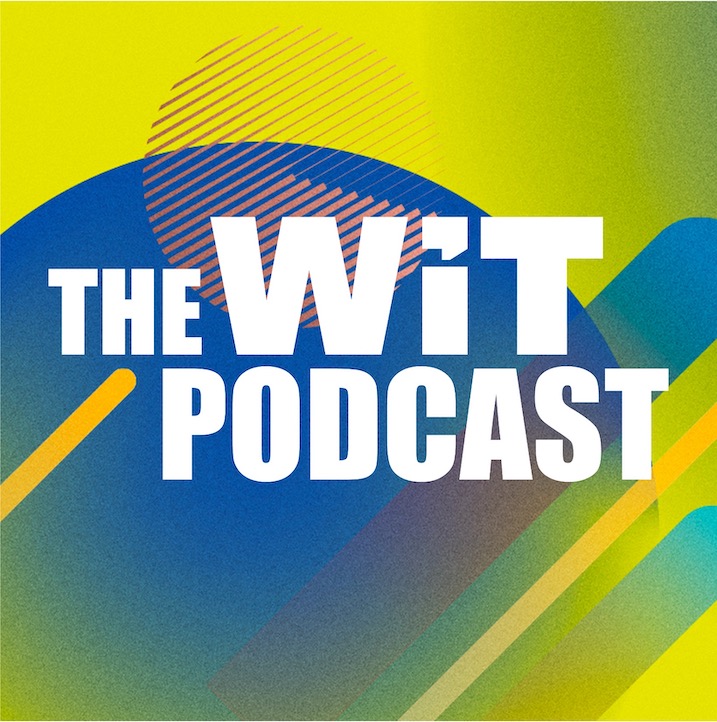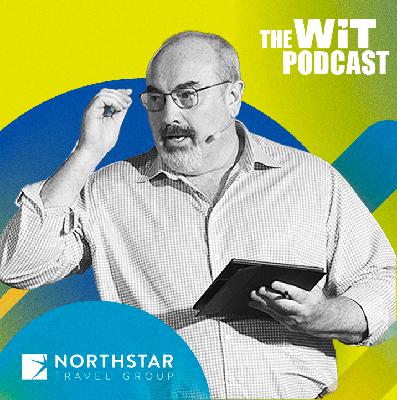Discover The WiT Podcast
The WiT Podcast

The WiT Podcast
Author: WiT
Subscribed: 2Played: 68Subscribe
Share
© Yeoh Siew Hoon
Description
The WiT Podcast, hosted by Yeoh Siew Hoon, shines the light on the travel industry as it undergoes its biggest crisis with the outbreak of COVID-19. It features conversations with travel industry leaders about how they are surviving the storm, and offers ideas and insights, on how to recover and emerge stronger.
116 Episodes
Reverse
On this week's episode, our AI hosts discuss current trends and opportunities within the tourism and hospitality sectors, based on a couple of reports that were highlighted last week on the Web In Travel website. One report by Booking.com spotlights Singapore-based travellers' growing awareness of tourism's social and environmental impact, indicating a preference for supporting local communities and a desire for better infrastructure to manage tourism's challenges rather than limiting visitor numbers. Another report by Mabrian examines the Middle Eastern hospitality market, emphasising the need for strategic development in mid-range hotel options and a realignment of guest expectations with different hotel categories to improve competitiveness and attract broader international tourism. ---------------------- We're trying something new with our weekly-ish podcast - we're outsourcing it to Artificial Intelligence. This is both an experiment and, if we're being honest, a convenient way to digest the top articles of the week from the WiT website into a nugget-of-a-podcast. We'll release a new episode every other Monday as a way to catch-up with last week's biggest news and articles from the WiT website.
On this week's episode, sports tourism's economic potential is explored via Expedia Group's latest study, highlighting strategies for businesses to capitalise on this market by understanding traveller behavior and preferences, such as offering appealing packages and experiences. Data-driven insights from Expedia and practical advice for marketing and engaging with sports tourists are also presented, while the impact of tourism on local economies and development is examined with a focus on creating sustainable and beneficial relationships between tourism and host communities. ------------------------------ We're trying something new with our weekly-ish podcast - we're outsourcing it to Artificial Intelligence. This is both an experiment and, if we're being honest, a convenient way to digest the top articles of the week from the WiT website into a nugget-of-a-podcast. We'll release a new episode every other Monday as a way to catch-up with last week's biggest news and articles from the WiT website.
On this episode, we address current shifts and future concerns within the global and regional travel industries. One piece examines the potential impact of new US tariffs on Asian travel, considering both negative consequences and the possibility of increased intra-Asia travel as a buffer. Another report highlights the rapid growth of Saudi Arabia's online travel agency market, detailing key players and significant increases in booking volumes for both air and hotel sectors. Finally, the International Air Transport Association provides data on global passenger demand for February 2025, noting a slight overall increase but also regional variations and concerns about North American markets.
On this episode, our (AI) hosts discuss significant shifts in the travel industry, particularly focusing on the impact of artificial intelligence and the evolving landscape of online travel agencies (OTAs). AI is portrayed as a transformative force, changing how travellers discover destinations, handle bookings, and expect personalised experiences, presenting both opportunities for startups and threats to traditional suppliers. The adoption of digital payment solutions like Alipay+ is highlighted as a key enabler for tourism, improving the visitor experience in regions like Malaysia. The OTA market in the UAE is experiencing double-digit growth, with specific companies leading in air and hotel bookings due to strategic advantages. Finally, we revisit WiT Africa and how the African travel market is a a unique space for innovation, where local knowledge and technology will drive its distinct development, despite facing challenges like payment fragmentation and global competition.
On this week's episode, Trip.com's "Momentum 2025" report highlights key travel trends for Singaporeans, including food-focused tourism, media-inspired destinations, cruise popularity, and entertainment-driven trips, emphasising social media's influence. Expedia's "Air Hacks Report" debunks common air travel myths, revealing optimal booking times, travel days, and dispelling notions about summer costs, premium fares, and crowded flights. Then, we cover how OAG's Filip Filipov discussed the need for a more customer-centric connected trip experience, advocating for data sharing and AI to enhance personalization and overall journey support. Filipov highlights the transformative potential of AI, particularly OpenAI's Operator, for revolutionising the travel agent role and loyalty programs. ------------------- We're trying something new with our weekly-ish podcast - we're outsourcing it to Artificial Intelligence. This is both an experiment and, if we're being honest, a convenient way to digest the top articles of the week from the WiT website into a nugget-of-a-podcast. We'll release a new episode every other Monday as a way to catch-up with last week's biggest news and articles from the WiT website.
On this week's Top of the WiT, Alipay and Fliggy reported a surge in Chinese travel spending during the Lunar New Year holiday, boosted by friendly visa policies. Sabre is working to solve airline content fragmentation and unlock the potential of AI in the travel industry. Sojern's "State of Destination Marketing 2025" report reveals that Destination Marketing Organizations (DMOs) are increasing digital advertising budgets and adopting AI, particularly for content creation. Furthermore, DMOs are shifting towards always-on campaigns and brand awareness, with social media remaining a key marketing tool. Data analysis remains a challenge for DMOs, presenting an opportunity to improve marketing effectiveness. Co-op marketing is growing, enabling DMOs to expand their reach. And more.
At WiT Singapore in October, numerous speakers spoke of how because of this more open environment, travel brands would be able to innovate faster – be it in providing the connected trip or personalisation – setting new standards for the global market. But clearly there are problems still to be fixed if we are to truly give our customers what they wish for or may not even know what they want, until we give it to them. In our "Year in Review" summary, we asked industry leaders two key questions – "What's the biggest problem the travel industry has yet to fix" and "One important trend that no one is talking about yet". Here's a summary of their answers.
We're trying something new with our weekly-ish podcast this year - we're outsourcing it to Artificial Intelligence. Don't worry, our human podcast producer is still on the payroll. For now. Jokes aside, we've relaunched Top of the WiT as a weekly digest that's purely hosted by Google's language models, specifically NotebookLM. While we've conducted this experiment a few times, the results seem to be improving and never fail to impress us. Industry leaders in the Asia-Pacific travel sector share their insights on the year 2024 and offer predictions for 2025. Their perspectives cover key trends, including the rise of silent travel and micro-sabbaticals, the impact of AI, and the need for sustainable tourism practices. Challenges discussed include overtourism, manpower shortages, and maintaining transparency. We also highlight Timothy O'Neil-Dunne's (Principal, T2Impact) op-ed on the evolution of the influencer economy. O'Neil-Dunne argues that the era of influencers chasing viral fame is shifting into one of strategic monetization, particularly in the travel industry. Once defined by the constant pursuit of likes and shares, the influencer landscape is evolving as creators recognize the need for sustainable revenue streams. Platforms like NaviSavi and initiatives like Expedia Travel Shops illustrate how influencers are leveraging their digital clout to go beyond fleeting virality and build tangible, monetizable assets, yes true social commerce. Finally, the report notes a surge in air passenger and cargo demand in the Asia-Pacific region, exceeding pre-pandemic levels.
This WiT Podcast exclusive is part of our "Conversations on Turning 20" series. If you've ever wondered what happens when a tech-loving realist runs one of Asia's biggest travel platforms through a decade of seismic change, tune in to the latest WiT Podcast with Omri Morgenshtern, CEO of Agoda. As Agoda turns 20 and Omri celebrates 10 years with the company, we sat down for a wide-ranging conversation in Singapore to reflect on the past and gaze boldly into the future.
The airline industry has long been on a journey toward personalisation, but few have embraced the power of AI and technology as strategically as SAS. Caroline Bergstroem, Head of Ancillary Products, Connectivity, and Retail at SAS, is leading the charge to create a seamless, one-stop-shop experience for passengers. Bergstroem envisions a world where travellers no longer have to juggle multiple platforms to book flights, hotels, car rentals, and experiences. Instead, SAS aims to provide an integrated ecosystem where everything can be arranged in one place. On the season finale of Future Lanes, a special WiT podcast series powered by Meili, Bergstroem shares insights on how AI, data analytics, and self-service are shaping the airline's future. --------------------------------------- "Future Lanes" is a special WiT Podcast series powered by Meili, a tech company that is rewriting the rules of ancillary distribution. The series, covering six episodes, is all about getting direct – cutting through the noise with unfiltered conversations on what's shaping the next decade of travel. No fluff – just straight, feisty talk about what it takes to find your future lane in travel.
In the fast-evolving world of travel technology, few voices resonate as deeply as Timothy O'Neil-Dunne, an aviation enthusiast with decades of experience in travel tech innovation, who believes that "technical debt" is holding back the travel industry from truly realising the potential of revolutionary tools like AI. To him, travel businesses face the daunting task of modernizing or risk becoming obsolete. --------------------------------------- "Future Lanes" is a special WiT Podcast series powered by Meili, a tech company that is rewriting the rules of ancillary distribution. The series, covering six episodes, is all about getting direct – cutting through the noise with unfiltered conversations on what's shaping the next decade of travel. No fluff – just straight, feisty talk about what it takes to find your future lane in travel.
This episode discusses the rising trend of blended travel in the Asia-Pacific region, where professionals increasingly combine business trips with leisure, prioritising flexibility and personal enrichment. Then, our AI hosts examine the fragmented but growing short-term rental market in APAC, highlighting regulatory complexities, the impact of trends like "set-jetting," and the increasing role of technology and professionalisation. Finally, a third segment profiles HeyMax, a Singaporean fintech startup that enables users to earn travel miles on everyday spending, aiming to disrupt traditional loyalty programs and make travel more accessible. ---------------- We're trying something new with our weekly-ish podcast - we're outsourcing it to Artificial Intelligence. This is both an experiment and, if we're being honest, a convenient way to digest the top articles of the week from the WiT website into a nugget-of-a-podcast. We'll release a new episode every other Monday as a way to catch-up with last week's biggest news and articles from the WiT website.
The travel industry is constantly evolving, and few airlines have been as relentless in shaping the low-cost carrier model as Ryanair. In a no-holds-barred conversation on the "Future Lanes" podcast, Ryanair CEO Eddie Wilson shares his candid views on everything from direct distribution to leveraging technology for a more efficient airline experience. --------------------------------------- "Future Lanes" is a special WiT Podcast series powered by Meili, a tech company that is rewriting the rules of ancillary distribution. The series, covering six episodes, is all about getting direct – cutting through the noise with unfiltered conversations on what's shaping the next decade of travel. No fluff – just straight, feisty talk about what it takes to find your future lane in travel.
"Exclusivity can sometimes limit customer choice and push operators into suboptimal business decisions. Today, partnerships that prioritize mutual benefits and customer-centric solutions are the way forward." – Michel Taride Michel Taride began his career at Hertz in 1980, a time when car rental operations were a far cry from today's tech-savvy landscape. Hertz was among the first car rental companies to launch a website, paving the way for real-time bookings and greater transparency. Today, the industry stands on the brink of another revolution. These technologies, coupled with new mobility models like car sharing, ride-hailing, and autonomous vehicles, promise to transform how consumers engage with transportation. For Mike McGearty, CEO and co-founder of Meili, the car rental industry's current challenge is modernizing its legacy systems to address the friction points that persist in customer experiences. Meili, the technology platform McGearty leads, is designed to empower service providers by streamlining direct distribution, improving data usage, and enhancing the end-to-end customer journey. In this episode, both McGearty and Taride discuss and debate their differences, similarities, and all the ways the industry is rapidly changing. --------------------------------------- "Future Lanes" is a special WiT Podcast series powered by Meili, a tech company that is rewriting the rules of ancillary distribution. The series, covering six episodes, is all about getting direct – cutting through the noise with unfiltered conversations on what's shaping the next decade of travel. No fluff – just straight, feisty talk about what it takes to find your future lane in travel.
"Scale and volume help you kill smaller competitors. But ultimately, disruptive technology can always kill a giant, and we killed giants in our last business, and we're going to kill them again in this business, simply because we have a disruptive stack that is just impossible for the big guys to copy." – Bobby Healy, Co-founder, Meili In the competitive world of travel technology, Irish entrepreneurs, Bobby Healy and Mike McGearty, are making waves with their latest venture, Meili. Founded in Dublin in 2021, Meili is setting out to disrupt the global car rental industry by enabling direct connections between car partners and customers. Their mission? To eliminate intermediaries and deliver a seamless, frictionless car rental experience. The startup is already live with nearly 40 customers, including airlines, train operators, hotel groups, and super-apps. By leveraging advanced AI and a proprietary tech stack, Meili is redefining ancillary distribution while building on decades of domain expertise. ----------------------------------------------------- "Future Lanes" is a special WiT Podcast series powered by Meili, a tech company that is rewriting the rules of ancillary distribution. The series, covering six episodes, is all about getting direct – cutting through the noise with unfiltered conversations on what's shaping the next decade of travel. No fluff – just straight, feisty talk about what it takes to find your future lane in travel.
"For me, an airport is a runway with a supermarket attached." – Kenny Jacobs, CEO of DAA (Dublin and Cork Airport Authority) The travel industry is at a crossroads. As passenger demand bounces back with renewed force, airports, airlines, and ancillary service providers are rethinking how they approach customer engagement, sustainability, and digital transformation. In this episode, WiT founder Yeoh Siew Hoon and co-host Bobby Healy, co-founder of Meili, spoke with industry veteran, Kenny Jacobs, CEO of DAA (Dublin and Cork Airport Authority) and former CMO of Ryanair. Together, they explored the complex landscape of modern airport operations, emerging trends in airport retail, and the role of technology in transforming the passenger experience. ----------------------------------------------------- "Future Lanes" is a special WiT Podcast series powered by Meili, a tech company that is rewriting the rules of ancillary distribution. The series, covering six episodes, is all about getting direct – cutting through the noise with unfiltered conversations on what's shaping the next decade of travel. No fluff – just straight, feisty talk about what it takes to find your future lane in travel.
First, Trip.com data reveals trends in Asia-Pacific Lunar New Year travel, including longer trips, increased cross-border travel, and a rise in bookings for unique destinations and cruises. Second, a panel discussion at the ASEAN Tourism Forum examines the impact of Online Travel Agencies (OTAs) on the industry, highlighting both their benefits and challenges for hotels and travelers. Third, the successful turnaround and sale of MG Group, a B2B hospitality marketplace, is detailed, showcasing its growth strategy and focus on the Asian market. Finally, the story of Hotel Treats, a platform offering curated day experiences, illustrates its organic growth and expansion from a local Mallorca-based company to a global player. It's all on this week's Top of the WiT.
"Slither" apparently is what snakes do. The fancier term is serpentine locomotion, also called lateral undulation – a side-to-side movement created when the snake's body forms S-shaped loops. Yes, next week on January 29, Chinese all over the world will usher in the Year of the Wood Snake – and there are plenty of predictions out there as to what this reptile will bring us. One almanac I came across says it "promises slow and steady development" and adds that "those who are patient, strategic and willing to embrace the Snake's wisdom will find they can thrive by adapting to a slower pace in all aspects of life". So even the Chinese "feng shui" masters are supporting the notion of slow travel or silent travel as some industry leaders had predicted in the Year in Review articles on our site.
New years always begin with such anticipation while we end each year with a tinge of nostalgia, a mood of reflection and sometimes, a sigh of relief that another year is over. Well, this is it – we're coming to the end of 2024 and as we wind down for what was yet another tumultuous year, it's time to look back, be grateful for the good things that happened and take the bad in our stride and move onwards and upwards. As part of our annual tradition, we asked our friends what they thought of 2024 and what they are looking forward to in the new year. Here's the first instalment.
2024 brought both promises and challenges to the travel industry, especially around sustainability, AI, and evolving traveller behaviors. As Timothy Hughes, Vice President of Corporate Development at Agoda, reflects on the past year, he offers insights that hint at what's ahead in 2025. From the persistent desire for leisure travel to AI's integration into the core of travel platforms, Hughes joined this special year-in-review edition of the WiT Podcast to share a vision that balances optimism with pragmatism.


